September 11, 2025
The pest control industry has always been about precision: the right treatment, at the right time, for the right customer.
However, in 2025, precision extends beyond eliminating pests to running your business with the same level of efficiency. That’s where a pest control CRM steps in.
Why Every Pest Control Business Needs a CRM in 2025
Instead of working across spreadsheets, sticky notes, and endless phone calls, pest control business software gives you one powerful hub to manage everything from scheduling jobs, tracking customer history, handling billing, and making sure no follow-up slips through the cracks.
In this guide, we’ll break down exactly why a pest control CRM is no longer optional in 2025, the features that matter most, and how the right management software can transform your field operations and customer experience.
Key Takeaways
- A pest control CRM centralizes scheduling, billing, and customer history, reducing errors and saving hours each week.
- With built-in customer communications tools, businesses can send automated reminders, follow-ups, and invoices that improve the overall customer experience.
- CRMs streamline field service and field operations, giving technicians mobile access and reducing callbacks.
- Features like inventory management and compliance reporting help businesses stay audit-ready and cut admin stress.
The Growing Need for Pest Control CRM in 2025
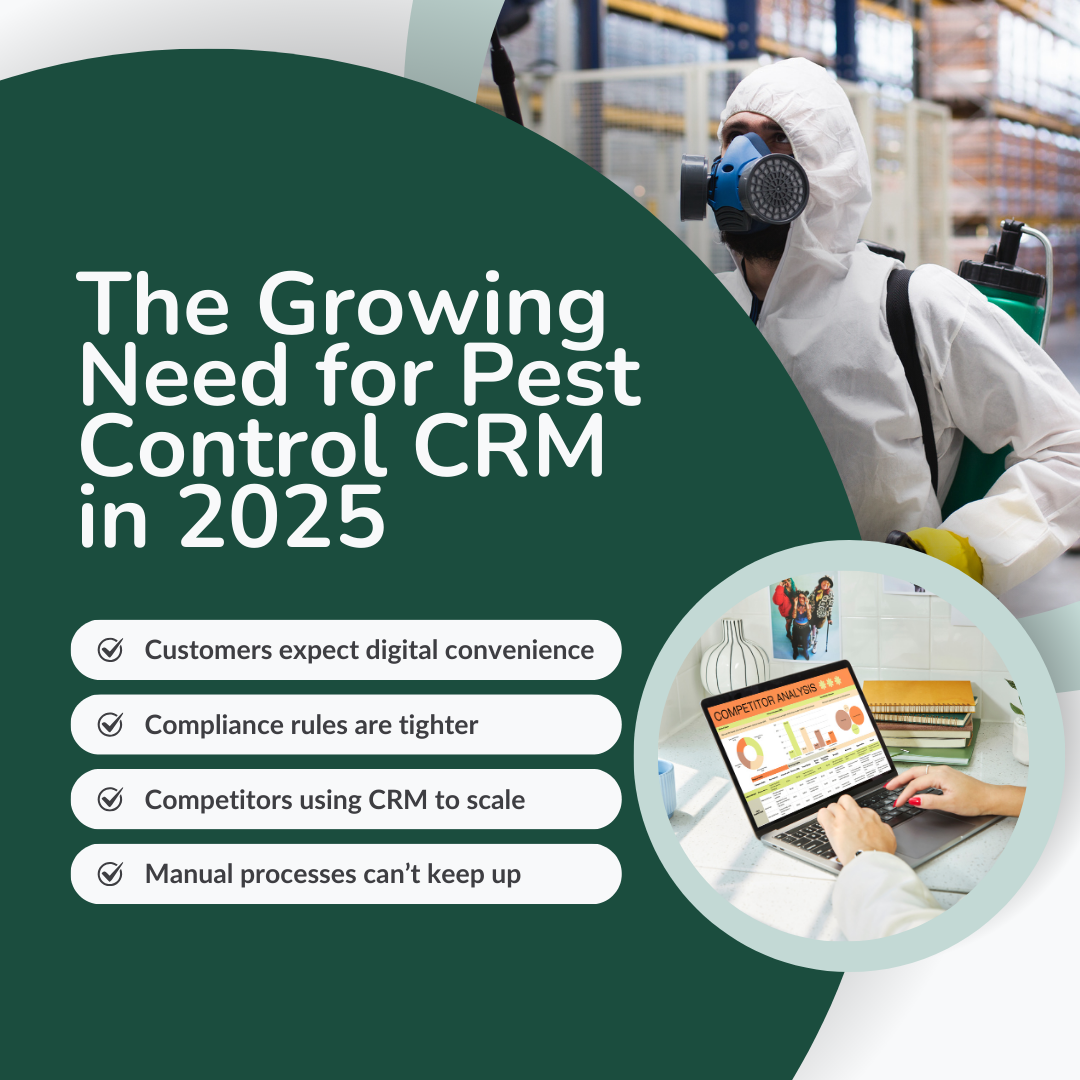
The pest control industry in 2025 looks very different from what it did even five years ago. Customers demand more transparency, compliance requirements are tighter, and competition is fiercer than ever. Businesses that continue to rely on paper logs, spreadsheets, or disconnected apps risk falling behind.
A pest control software addresses these shifts head-on, creating structure and efficiency where manual processes fall short. Here’s why the demand has never been greater:
1. Evolving Customer Expectations
Today’s customers expect more than just pest elimination; they expect professionalism, digital convenience, and proactive communication.
A CRM empowers businesses to track service history, send timely updates, and deliver a seamless customer experience that builds trust and loyalty.
2. Regulatory Pressures & Compliance Needs
From pesticide usage logs to safety audits, compliance is no longer optional. Manual tracking leaves too much room for error. With built-in compliance reporting, CRMs automate record-keeping, giving owners peace of mind and protecting the business from costly penalties.
3. Competitive Advantage Through Technology
Your competitors aren’t standing still. Many are already adopting business management software to streamline field operations and gain a competitive edge. A CRM ensures you can compete with speed, accuracy, and customer service: three areas where technology makes all the difference.
4. Manual Processes Can't Keep Up
Paper logs and spreadsheets may have worked when the business was small, but they simply don’t scale. As customer bases grow and compliance demands intensify, manual processes create bottlenecks, missed follow-ups, and costly errors.
This is where a CRM helps you by replacing that fragile system with automated workflows and real-time visibility. It ensures your operations stay efficient no matter how fast you grow.
Check out: Best Pest Control Software for Small Businesses in 2025
What a CRM Does for Pest Control Companies
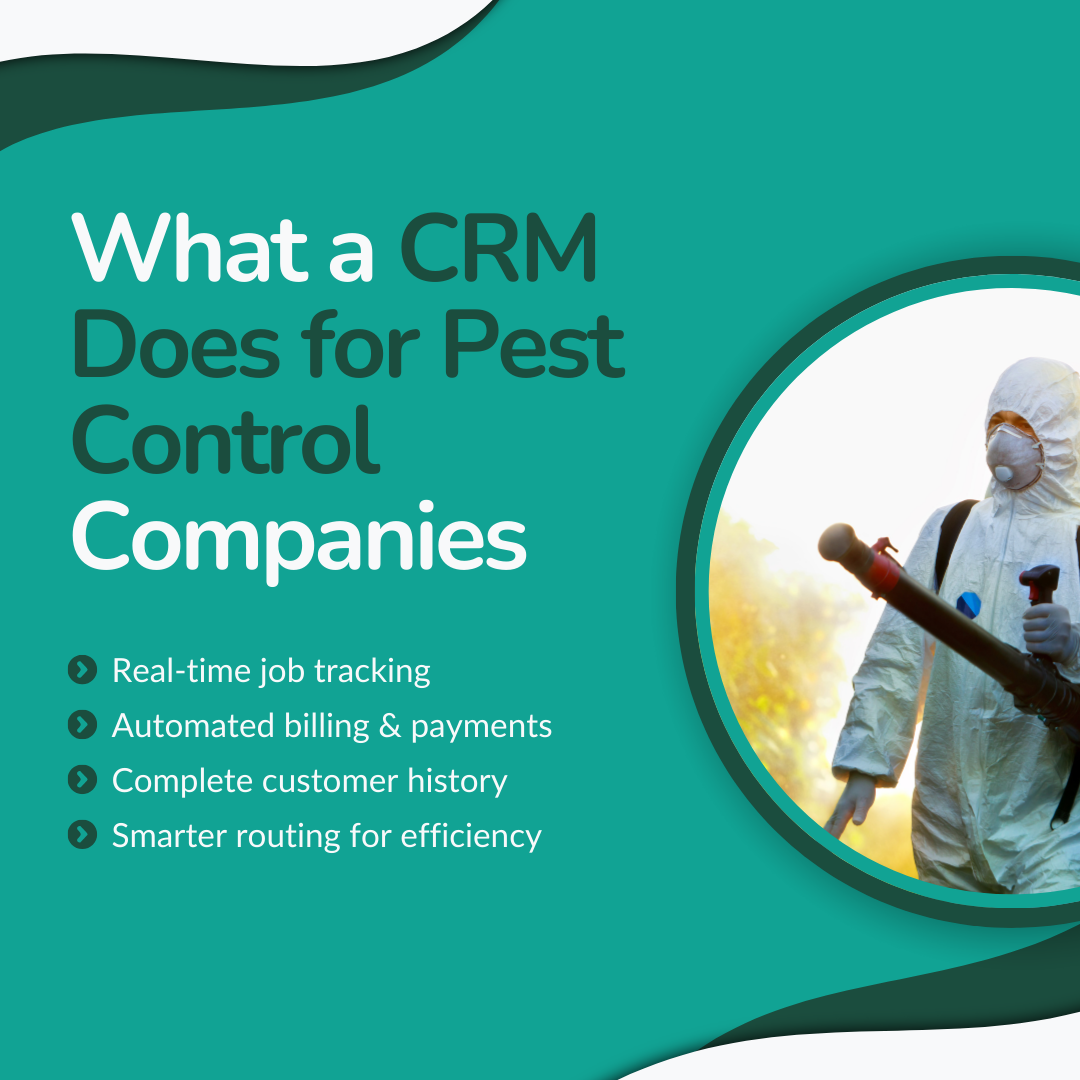
For pest control businesses, growth often collides with complexity.
What begins as a manageable operation quickly turns into a web of missed follow-ups, duplicate entries, and constant back-and-forth between office staff and field technicians.
A pest control CRM reshapes how you deliver services, run operations, and scale profitably.
1. Centralized Job Tracking & Field Operations
A modern CRM acts as the command center of your business. Every job, whether scheduled or in progress, is tracked in real time.
For field service businesses, this means technicians arrive with full clarity: they know the route, the equipment, and the customer’s history before they even knock on the door. No guesswork. No wasted trips. Just seamless execution.
2. Integrated Billing, Estimates, and Payments
Time lost to invoicing and chasing payments is time you never get back. By automating estimates and enabling digital payments, a CRM eliminates bottlenecks in your cash flow. The result is not just faster billing, but also fewer errors, ensuring that your numbers stay as precise as your treatments.
3. Detailed Customer History & Communications
Every interaction is captured, including service dates, special instructions, and prior issues at a property.
With that knowledge, your staff can personalize every conversation and every treatment. Combined with built-in automation, your customer communications happen effortlessly, elevating trust and professionalism with every touchpoint.
4. Smarter Routing and Field Efficiency
A CRM with integrated pest control routing software ensures your technicians spend less time in traffic and more time servicing accounts. Smarter scheduling reduces fuel costs, increases daily job capacity, and keeps your team sharp.
For pest control operators, the value of a CRM goes far beyond “organization.” It’s about reclaiming control, building consistency, and efficiency across every corner of the business. In today’s market, that difference is what separates companies that survive from those that dominate.
Core Features to Look for in Pest Control Business Management Software
The right CRM solution should actively support every stage of the customer lifecycle, from the first call to long-term retention.
For pest control companies, this means choosing field service management software that is tailored to the demands of scheduling, compliance, and repeat visits.
1. Proposal & Estimate Builder with E-Signatures
First impressions matter, and estimates often set the tone for the customer relationship. Moreover, no one wants to sit at a kitchen table with a customer flipping through notes and trying to “ballpark” a price. That’s where a proposal and estimate builder changes the game.
A CRM with a built-in proposal and estimate builder makes it easy to generate professional quotes in minutes.
With e-signatures included, customers can approve instantly, reducing delays and helping you win work faster while keeping the process organized and consistent.
2. Online Customer Portal
Today’s customers expect self-service options. An online customer portal allows clients to schedule visits, review service history, and make online payments without
picking up the phone.
This enhances convenience, a key differentiator in the modern pest control service market.
3. Automated Follow-Ups & Notifications
Customer loyalty is built on consistency. Automated reminders and follow-ups keep clients engaged without adding work for staff. This feature improves your customer relationship management efforts, ensuring you stay top-of-mind when future services are needed.
4. Inventory Management for Chemicals & Equipment
Running out of product mid-job damages credibility. Integrated inventory tracking ensures your business stays stocked, compliant, and cost-efficient.
5. Compliance Reporting Tools to Stay Audit-Ready
Regulatory audits are a reality of the industry. With built-in compliance modules, a CRM automatically generates accurate records, reducing risk and protecting your reputation.
By combining these features, a CRM future-proofs your business. With better visibility, smoother workflows, and the ability to access customer data at any moment, you position your team to serve clients with precision and scale confidently.
How CRM Improves Customer Experience & Retention
In pest control, trust is everything. Customers pay for peace of mind, and a CRM helps you deliver on that promise by tightening communication, reducing friction, and creating a level of professionalism that keeps clients coming back.
When executed well, it’s the difference between one-time jobs and long-term relationships. Here's how CRM improves customer experience & retention:
1. Faster Response Times
Nothing frustrates customers more than waiting. But with a CRM, teams can respond instantly to inquiries, schedule appointments on the spot, and dispatch technicians efficiently.
Quicker responses mean happier customers and, ultimately, more customers choosing your service over competitors.
2. Transparent Customer Communication at Scale
A CRM makes it easy to handle batch customer communications such as appointment reminders, seasonal service alerts, or promotional campaigns. By automating these touchpoints, businesses maintain consistent engagement without overloading staff.
3. Seamless Office and Field Coordination
Service quality often breaks down between the office and the field. A CRM eliminates this gap by aligning office and field operations in one system.
Dispatchers, technicians, and managers see the same data in real time, so no detail is ever lost in translation.
4. Personalized Service That Elevates Satisfaction
With customer history stored in one place, technicians arrive prepared and proactive. This creates a sense of continuity that builds trust and raises customer satisfaction levels. So, instead of being treated like just another job, each client feels seen and understood.
5. Experiences That Set You Apart
When a CRM is fully leveraged, it delivers unparalleled customer experiences, and that’s the kind of service that transforms satisfied clients into loyal advocates, securing your reputation in a competitive market.
Streamlining Field Operations with CRM
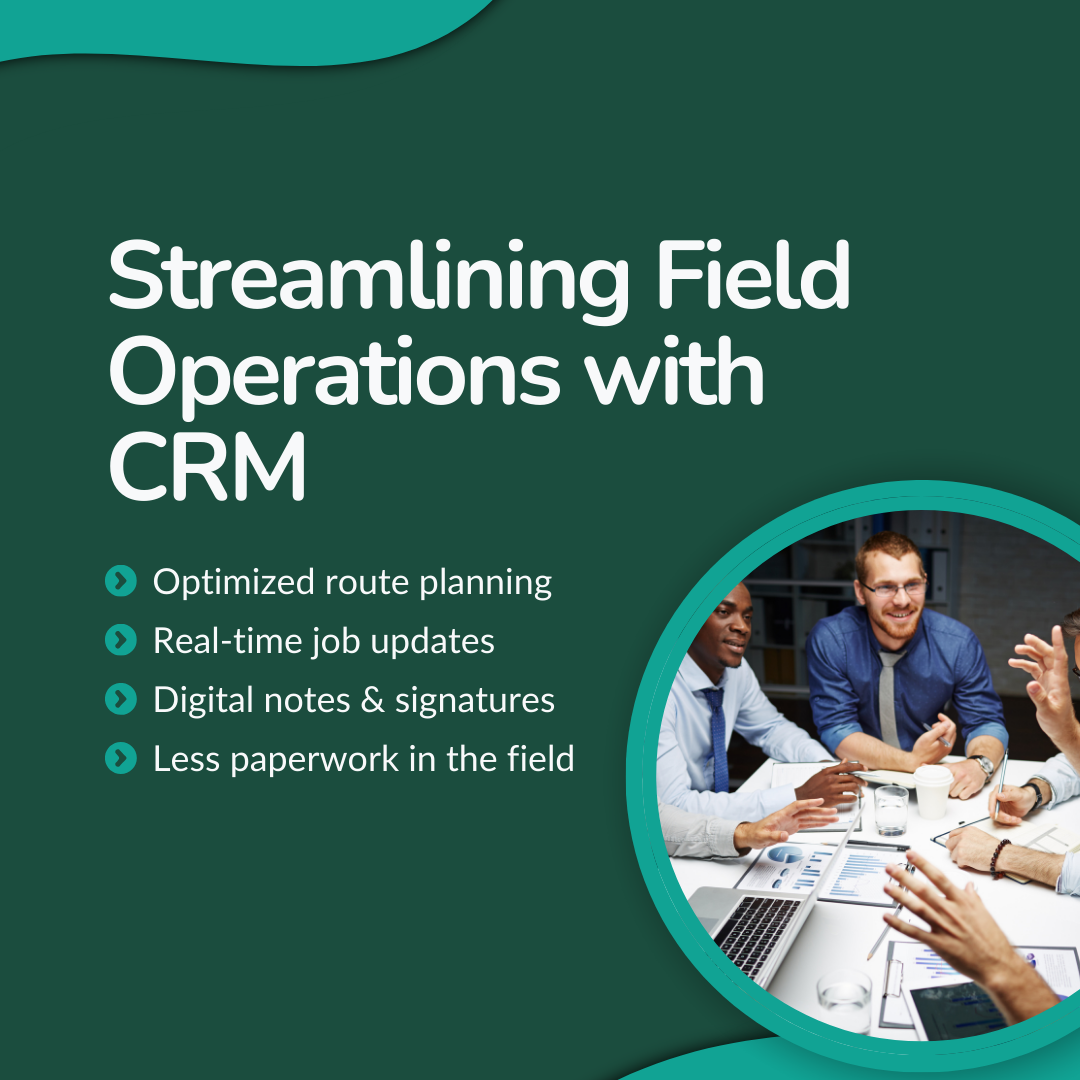
Behind every smooth customer experience is a well-coordinated field team.
However, many pest control businesses face challenges such as overlapping schedules, wasted travel time, and endless back-and-forth between technicians and the office.
A CRM removes this friction by giving teams real-time visibility, optimized routes, and tools that make fieldwork seamless.
1. Optimized Route Planning
Fuel, time, and technician energy are too valuable to waste, and that's why a CRM’s smart scheduling engine ensures routes are designed for efficiency. This reduces drive time, cuts costs, and enables more jobs per day without overloading your team.
2. Real-Time Job Status Updates
With CRM-enabled updates, technicians log progress instantly from the field. This removes the guesswork of whether a job is done or waiting for paperwork.
Moreover, managers can monitor workloads in real time, while customers stay informed through proactive notifications.
3. Digital Notes & Signatures
Technicians no longer need to juggle clipboards or risk losing important paperwork. With digital note-taking and e-signature capture built right into the CRM, every detail from treatment notes to customer approvals is stored securely in real time.
4. Reduced Paperwork in the Field
A CRM replaces manual forms like clipboards and carbon copies with digital workflows, so technicians capture notes, photos, and signatures directly in the system.
This speeds up fieldwork and ensures accuracy, creating a reliable record that supports customer trust and compliance requirements.
Also read: Pest Control Software vs Manual Scheduling: Why It Matters
How CRM Helps with Back-Office Efficiency
Behind every technician in the field is an office team that keeps the business running. Billing, compliance, scheduling, and recordkeeping may not grab headlines, but they’re the backbone of any pest control company.
The challenge is that these processes often eat up hours of staff time and leave plenty of room for mistakes. A CRM changes that dynamic by turning the back office into a place of clarity and control instead of constant catch-up.
1. Centralized Task Management
Managing dozens of moving parts can overwhelm even the most organized office. A CRM with task management built in helps staff assign, track, and complete admin work without losing sight of priorities.
From following up on customer calls to preparing reports, everything lives in one system, reducing missed steps and last-minute hiccups.
2. Streamlined Internal Communication
One of the biggest sources of inefficiency is miscommunication. Instead of relying on emails or sticky notes, some CRMs include a customizable message center where office staff and field technicians can exchange updates in real time. This creates a single source for internal communication, reducing confusion and wasted time.
3. Unified Office Operations
Too often, businesses rely on a patchwork of spreadsheets and single-purpose tools that don’t talk to each other. A CRM keeps those moving parts into one system for office operations and daily office management.
By streamlining the back office, CRM builds a stronger foundation for growth. With routine tasks handled accurately in the background, staff can focus on strategy, customer care, and long-term planning instead of getting buried in admin work.
Making the Case for a CRM Investment
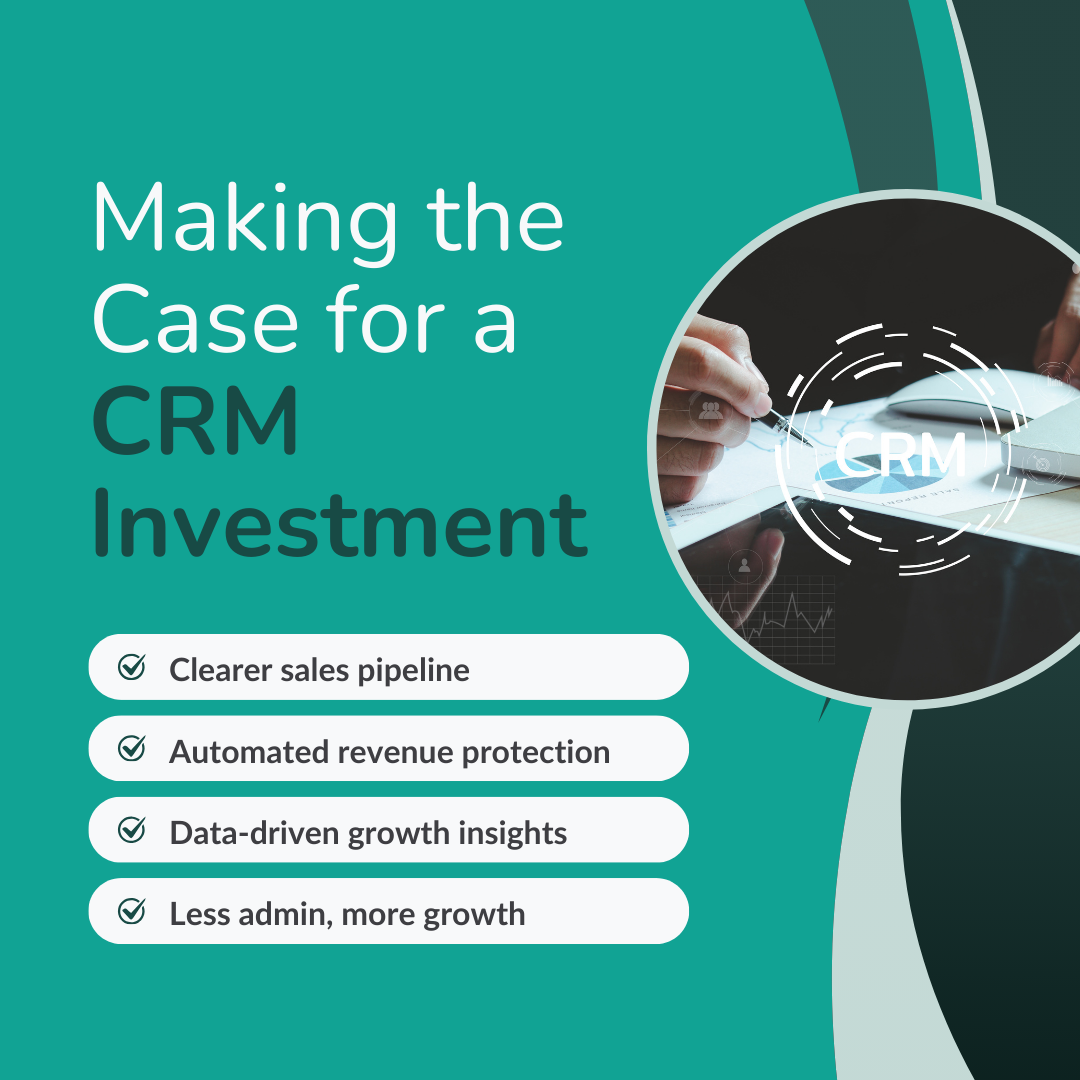
For many owners, investing in new software feels like a cost, but in practice, the right CRM quickly proves itself as a revenue driver.
By cutting down on wasted time, reducing mistakes, and giving your team sharper tools, a CRM pays for itself in both efficiency and growth.
1. Clearer Sales Pipeline
A CRM brings order to sales management by tracking prospects, follow-ups, and deals in one place. The sales funnel becomes clearer, helping owners see exactly where business is being won and where it’s being lost. That visibility means better decisions, faster closes, and a more reliable pipeline.
2. Automated Revenue Protection
Automated billing reminders ensure invoices don’t get overlooked, reducing late payments and keeping revenue steady. Instead of the office chasing down balances, staff can focus on high-value work, knowing the system is quietly handling the routine.
3. Data-Driven Growth Strategies
When all your customer information is in one place, patterns start to emerge: which services are most requested, which customers are most profitable, and where upsell opportunities lie. A CRM turns those insights into smarter marketing strategies that help you reach the right people at the right time.
4. Less Admin, More Growth
Endless paperwork and manual data entry drain hours from your day. A CRM takes those repetitive tasks off your plate by automating scheduling, invoicing, follow-ups, and compliance logs.
With the admin side streamlined, the staff get back precious time to focus on strategy, customer relationships, and expanding the business areas that actually fuel growth.
Choosing the Right Pest Control CRM for Your Business
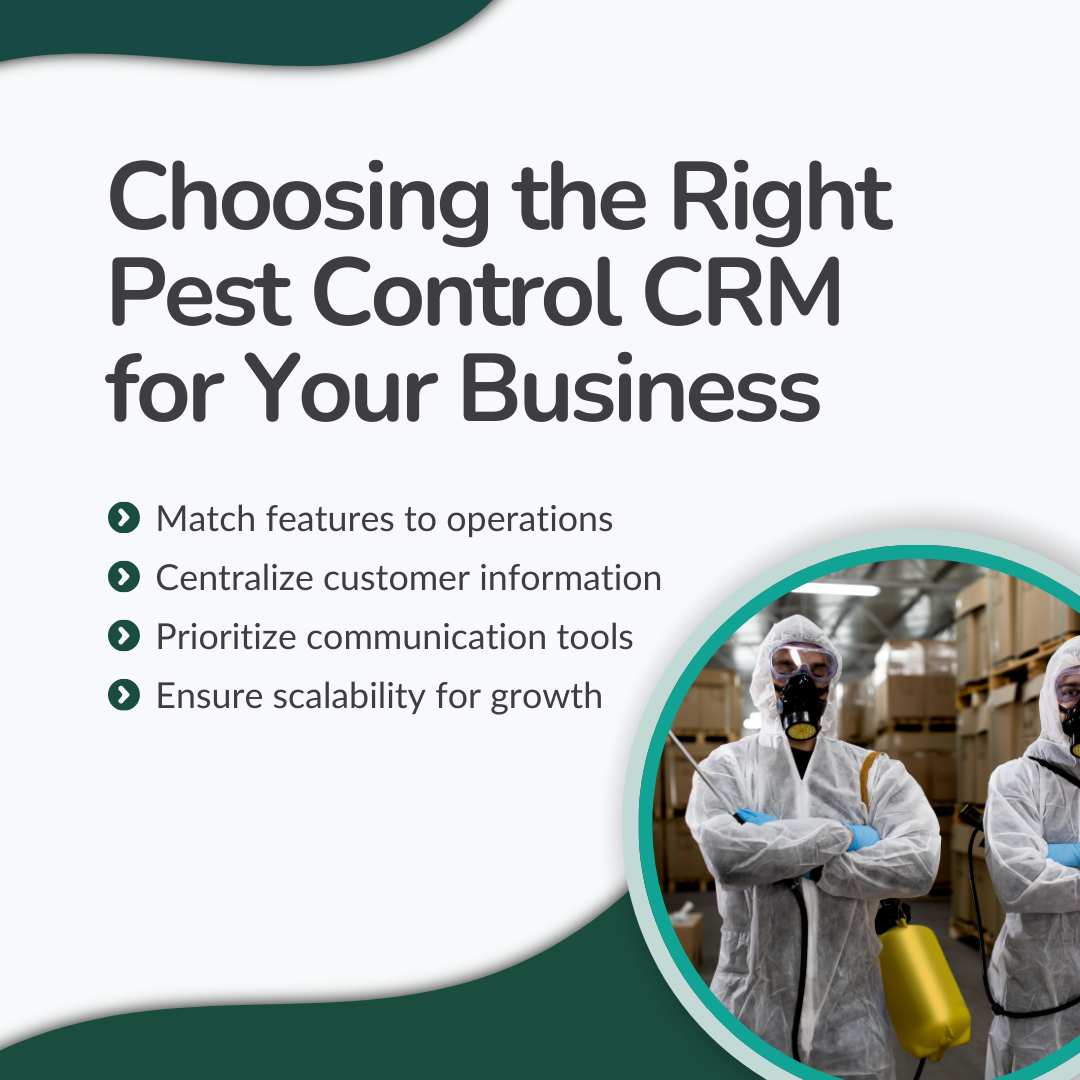
Not every CRM fits every pest control company. The right choice depends on the size of your team, the way you operate, and the features you need most. Here are the essentials to keep in mind:
1. Match Features to Daily Operations
A strong CRM should handle both office operations and the field. Look for a system with a dedicated mobile app so technicians can log updates, capture notes, and process payments on-site. In the office, built-in task management ensures no job or follow-up slips through the cracks.
2. Keep Customer Information Centralized
Every detail, from service history to payment records, should live in one place. A CRM that centralizes customer information makes it easy for staff to answer questions, schedule new jobs, and personalize service without digging through files or emails.
3. Prioritize Communication Tools
Clear communication keeps teams and customers aligned. Some platforms even offer a customizable message center to simplify updates between office staff and technicians. For clients, an online customer portal provides scheduling, payment, and history access at their convenience.
4. Consider Scalability
If you’re servicing large contract project sites or plan to grow your team, choose software that scales. Start simple, but ensure your CRM has the flexibility to support more technicians, more customers, and more complex workflows down the road.
If you’re comparing options, it’s worth looking at platforms designed specifically for pest control. PestBase is one such example: easy to use, affordable, and built around the day-to-day realities of running a pest control business.
Meet PestBase
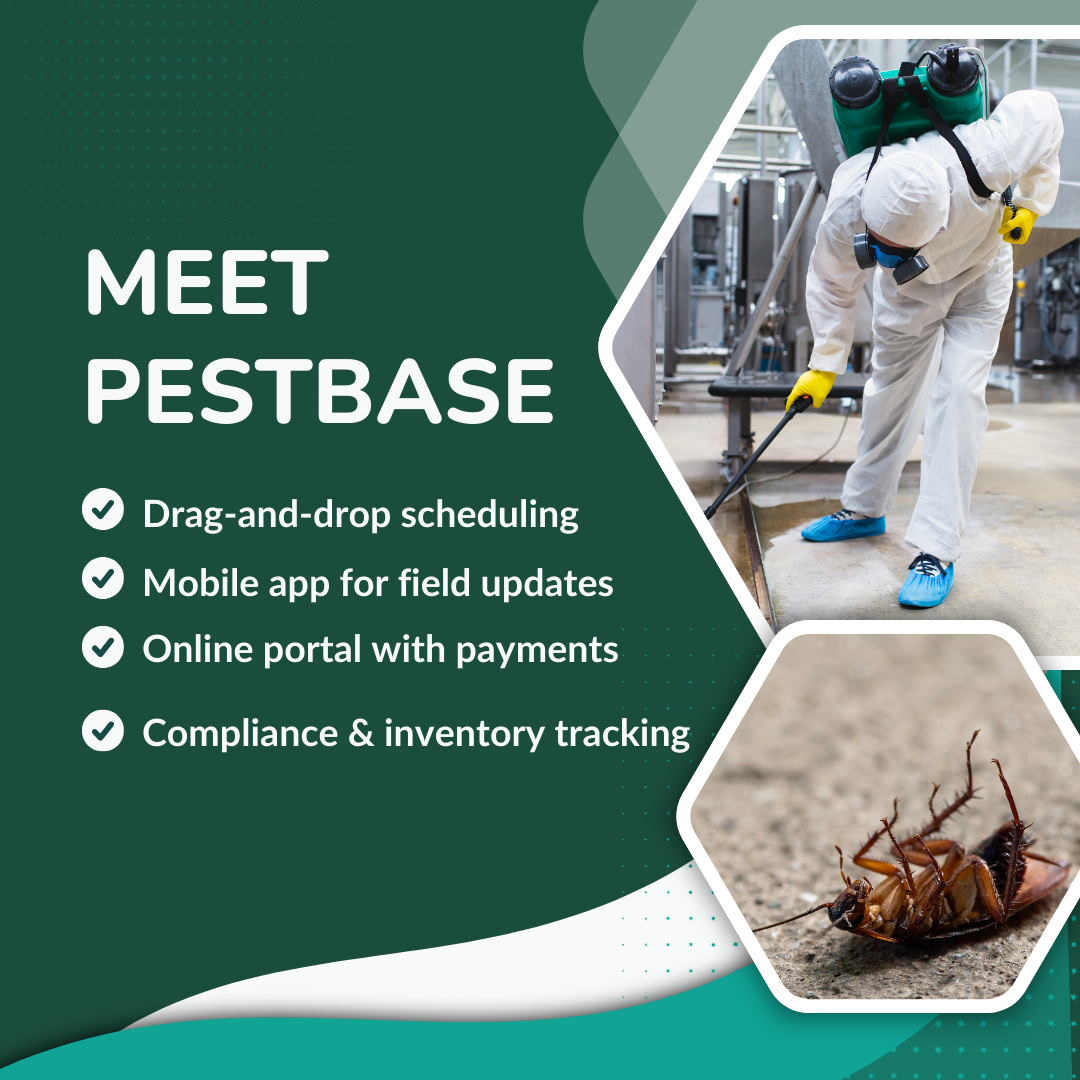
PestBase is purpose-built for pest control companies, giving you everything you need to book jobs, manage customers, and keep office and field in sync, all in one simple platform.
Key Features
- Lead Capture & Automated Follow-Ups: The feature helps you collect leads from forms, canvassing, or referrals and keep them moving with automatic reminders.
- Proposal & Estimate Builder with E-Signatures: Create polished, branded quotes in minutes. Customers can review and approve instantly, helping you win jobs faster.
- Smart Scheduling & Route Optimization: Through you can drag-and-drop scheduling, which makes dispatch easy, while route optimization ensures techs spend less time on the road and more time with customers.
- Technician App with On-Site Tools: Field staff get full job details, notes, and schedules directly on their phones. They can log updates, upload photos, and capture signatures in real time.
- Invoice & Payment Management: PestBase facilitates generating invoices as soon as jobs are complete and accepts payments online.
- Inventory Tracking & Compliance: Monitor chemical use, keep stock levels in check, and generate reports that keep you compliant with industry regulations.
Trusted by growing pest control teams, Pestbase helps operators simplify daily operations. It’s lightweight, affordable, and built for the way pest control businesses run.
Ready to see how PestBase can fit into your workflow? Book your demo today.
FAQs
1. Which is the best pest control CRM for small businesses?
Look for lightweight tools designed for pest control. PestBase is a popular choice for smaller teams.
2. Can CRM software integrate with my current scheduling tools?
Yes. Most CRMs connect with or replace existing scheduling systems.
3. How much does pest control management software cost?
Costs vary by features and team size, but many offer scalable plans.
4. Will my team need training to use a CRM?
Modern CRMs are user-friendly, with mobile apps that make adoption quick.
5. Does CRM help with compliance and safety reporting?
Yes. Automatic logs and reports provide the kind of control software help that makes audits and safety checks easier.
